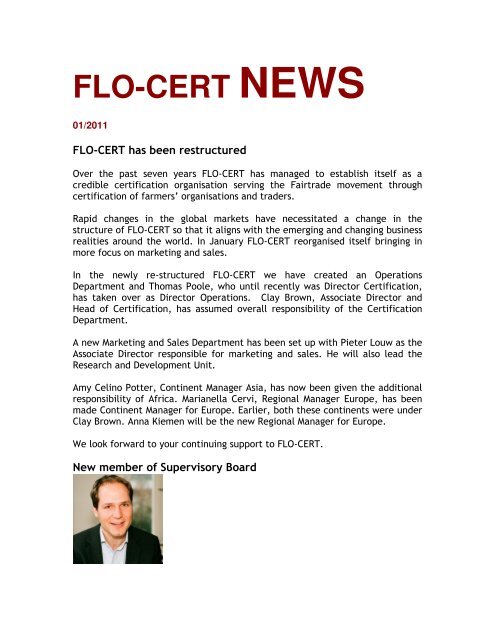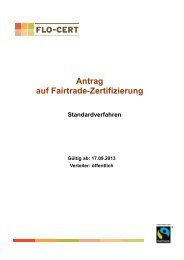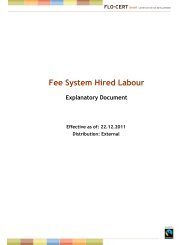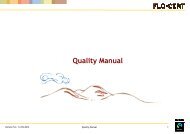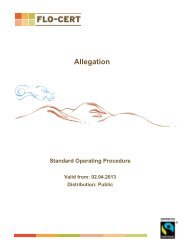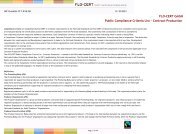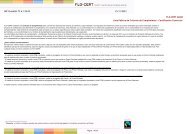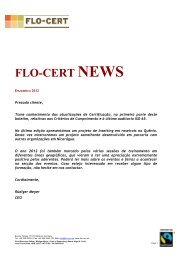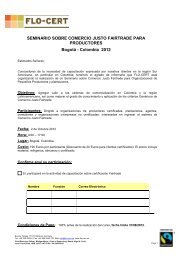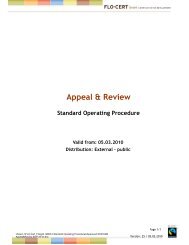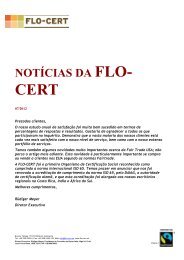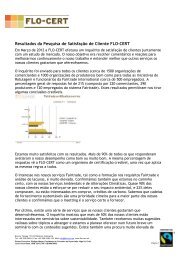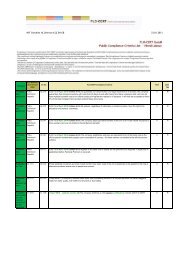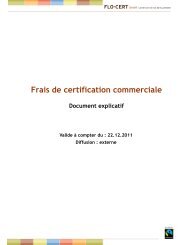CERT Newsletter items March 2011_final 1 - FLO-CERT GmbH
CERT Newsletter items March 2011_final 1 - FLO-CERT GmbH
CERT Newsletter items March 2011_final 1 - FLO-CERT GmbH
You also want an ePaper? Increase the reach of your titles
YUMPU automatically turns print PDFs into web optimized ePapers that Google loves.
<strong>FLO</strong>-<strong>CERT</strong> NEWS<br />
01/<strong>2011</strong><br />
<strong>FLO</strong>-<strong>CERT</strong> has been restructured<br />
Over the past seven years <strong>FLO</strong>-<strong>CERT</strong> has managed to establish itself as a<br />
credible certification organisation serving the Fairtrade movement through<br />
certification of farmers’ organisations and traders.<br />
Rapid changes in the global markets have necessitated a change in the<br />
structure of <strong>FLO</strong>-<strong>CERT</strong> so that it aligns with the emerging and changing business<br />
realities around the world. In January <strong>FLO</strong>-<strong>CERT</strong> reorganised itself bringing in<br />
more focus on marketing and sales.<br />
In the newly re-structured <strong>FLO</strong>-<strong>CERT</strong> we have created an Operations<br />
Department and Thomas Poole, who until recently was Director Certification,<br />
has taken over as Director Operations. Clay Brown, Associate Director and<br />
Head of Certification, has assumed overall responsibility of the Certification<br />
Department.<br />
A new Marketing and Sales Department has been set up with Pieter Louw as the<br />
Associate Director responsible for marketing and sales. He will also lead the<br />
Research and Development Unit.<br />
Amy Celino Potter, Continent Manager Asia, has now been given the additional<br />
responsibility of Africa. Marianella Cervi, Regional Manager Europe, has been<br />
made Continent Manager for Europe. Earlier, both these continents were under<br />
Clay Brown. Anna Kiemen will be the new Regional Manager for Europe.<br />
We look forward to your continuing support to <strong>FLO</strong>-<strong>CERT</strong>.<br />
New member of Supervisory Board
Dr. Christian Thorun has joined the Supervisory Board of <strong>FLO</strong>-<strong>CERT</strong>.<br />
Dr Thorun is the founder and managing director of ConPolicy - an Institute for<br />
Consumer Policy. Before the founding of the institute, he worked at the<br />
Federation of German Consumer Organisations in Berlin. His responsibilities<br />
included economic policy, competition, privacy and corporate social<br />
responsibility (CSR). Furthermore, he was co-chair of the Information Society<br />
Working Group of the Transatlantic Consumer Dialogue (TACD) and spokesperson<br />
of the international consumer organisations in the negotiations of an<br />
international standard on social responsibility - ISO 26000.<br />
Dr Thorun holds doctoral and master degrees in International Relations from<br />
the University of Oxford. He has received a range of scholarships including the<br />
Cecil Rhodes scholarship for his studies in Oxford and an undergraduate and<br />
graduate scholarship from the German Friedrich-Ebert-Foundation.<br />
He is frequently invited as an expert on consumer policy in political hearings<br />
and is active in public debate; contributed his expertise in events organised by<br />
the EU Commission, OECD, the German Parliament and universities. He also<br />
teaches at the Quadriga Hochschule and the Quadriga Academy.<br />
Dr Thorun has two daughters and lives in Bad Honnef near Bonn.<br />
<strong>FLO</strong>-<strong>CERT</strong> certifies gold<br />
Cotapata, small-scale mining cooperative in Bolivia, has become the first<br />
organisation to receive a Fairtrade and Fairmined certificate. The organisation<br />
was certified in December 2010.<br />
Photo: ARM<br />
In February <strong>2011</strong> another mining cooperative, Oro Verde (Green Gold) from<br />
Consejo Comunitario in Condoto, Colombia, producing ecological gold, received<br />
its certificate. It coincided with the launch of Fairtrade and Fairmined gold<br />
jewellery in the UK market.
The first two mines that have been certified represent two distinct but typical<br />
mining schemes: Cotapata in Bolivia is a small hard-rock mine in a mountainous<br />
area close to La Paz, feeding 88 families, being formalized in a cooperative<br />
since 1991. The second, Oro Verde consists of 112 families of miners, who<br />
make their living through alluvial small-scale mining in the Chocó Region in<br />
Colombia.<br />
Both these organisation have been complying with environmental and social<br />
standards for years.<br />
The Fairtrade Certificate now improves chances for Southern producers to<br />
better access the Northern markets, without going through intermediaries who<br />
do not guarantee a fair deal.<br />
Since the Fairtrade and Fairmined Standard for Gold had been published in<br />
2010, mining organisations from Latin America can apply for Fairtrade and<br />
Fairmined certification of gold and associated precious metal, which is silver<br />
and platinum. The gold standard has been developed in close collaboration<br />
between Fairtrade International (<strong>FLO</strong> e.V.) and the Alliance for Responsible<br />
Mining (ARM).<br />
Rings, bracelets and chains containing certified gold will be labeled with the<br />
first dual label: Fairtrade and Fairmined.<br />
Photo: Ronald Köpke
<strong>FLO</strong>-<strong>CERT</strong> was involved from the very inception of the idea to certify artisanal<br />
gold. We supported the two organisations in setting the standards by<br />
conducting pilots and field studies.<br />
About 100 million people worldwide depend on artisanal and small scale mining<br />
for their incomes and they contribute up to 10% of the global gold production.<br />
There is a huge potential for Fairtrade and Fairmined to improve living and<br />
working conditions for these miners and to recognise development and<br />
formalization of a sector that has been neglected in many parts of the world.<br />
If you are interested in reading more, please visit www.fairgold.org<br />
Better lives, better beans, better bars<br />
Kuapa Kokoo Farmers’ Union, one of the biggest and the oldest Fairtrade<br />
Certified farmers’ organisations of cocoa in Ghana, launched its child labour<br />
programme on November 15 at a function organised in Kumasi. It also released<br />
the first annual report of its programme on elimination of worst forms of child<br />
labour on the farms of its members.<br />
The programme was presided over by a representative of the Queen Mother of<br />
Ashanti Kingdom of Ghana.<br />
Speaking at the function, Ruediger Meyer, CEO of <strong>FLO</strong>-<strong>CERT</strong>, lauded the efforts<br />
made by Kuapa Kokoo to prevent and eliminate child labour from its farms. He<br />
said that Kuapa Kokoo has set an example for farmers’ organisations by<br />
implementing an internal control system and launching a community based<br />
campaign to eliminate child labour.<br />
“There is child labour in agriculture production, in carpets and many other<br />
sectors, but I have never seen any cooperative like Kuapa Kokoo taking it so<br />
seriously. What you have done here is set an example for cooperatives all over<br />
the world and I am sure many will follow,” he said.
“Better lives, better beans, better bars,” Ruediger said elaborating that if the<br />
farmers’ lives are improved then the productivity and quality will also increase.<br />
Ruediger also visited some farms of Kuapa Kokoo’s members in the Ashanti<br />
region and held discussions with farmers.<br />
<strong>FLO</strong>-<strong>CERT</strong>’s new web interface: Ecert 3 rd Party Portal<br />
In January <strong>2011</strong>, <strong>FLO</strong>-<strong>CERT</strong> <strong>GmbH</strong> successfully launched the first version of a<br />
new web based stakeholder interface: the 3 rd Party Portal. This portal is<br />
fashioned to enable easy access to audit and certification data which is stored<br />
in <strong>FLO</strong>-<strong>CERT</strong>’s certification database Ecert.<br />
Since its launch, <strong>FLO</strong>-<strong>CERT</strong> has started to roll-out the 3 rd Party Portal to its<br />
stakeholders namely LIs and Fairtrade International. Other interested parties<br />
and organisations are welcome to use this new tool as well. If you are<br />
interested, please contact Frank Brinkschneider, Director Technical Services,<br />
at f.brinkschneider@flo-cert.net .<br />
The aim of the 3 rd Party Portal is to add more transparency to <strong>FLO</strong>-<strong>CERT</strong>’s audit<br />
and certification process by sharing audit and certification relevant information<br />
with its clients across the Fairtrade community. A great step forward is that<br />
the data is always synchronized in real time with the productive certification<br />
database Ecert. Therefore users can always rely on the most recent actual<br />
data.<br />
A 3 rd party can view data of certified organisations only after a “consent to<br />
release” is signed by the organisation. Before getting access, 3 rd party users<br />
will also have to sign a confidentiality agreement with <strong>FLO</strong>-<strong>CERT</strong>.<br />
<strong>FLO</strong>-<strong>CERT</strong> will gladly accept feedback from its stakeholders to increase the<br />
information flow, transparency on audit and certification processes, and<br />
additional data required within Fairtrade.<br />
Staff Corner
Dorra Zairi, Certification Analyst<br />
I joined <strong>FLO</strong>-<strong>CERT</strong> some five months ago after finishing my masters in<br />
development studies at the School of Oriental and African Studies (SOAS),<br />
London. <strong>FLO</strong>-<strong>CERT</strong> is like a small melting pot with people from all over. I am<br />
Tunisian and I very quickly felt comfortable in this multicultural and<br />
multilingual environment where everyone speaks an average of two languages.<br />
It has been great to work in such an international environment.<br />
As a certification body, <strong>FLO</strong>-<strong>CERT</strong> has a close relationship with producers and<br />
traders from all over the world. Being a certification analyst, I am in contact<br />
with producers and traders from different countries namely Palestine, Egypt,<br />
Tunisia and Morocco and I feel that my everyday work has a real impact on<br />
their lives.<br />
I particularly enjoy my work as it allows me to guide the producers and traders<br />
throughout the certification process from the moment they apply to the<br />
moment they get certified. Working with <strong>FLO</strong>-<strong>CERT</strong> allows me to actively<br />
participate in building a credible Fairtrade market, thus contributing in<br />
building a better future for producers and traders in developing countries.<br />
And what I like the most about working here is that everyday when I come to<br />
work I can feel that everyone at the office is motivated by the same idea, that<br />
is – making the world a better place for producers across the globe .<br />
Auditor Corner
Philipp Sebastian Seitz<br />
The most enjoyable part of conducting a Fairtrade audit is the visit to the<br />
farmers’ fields and interacting with them individually as well as in a group.<br />
Most farmers that I have met come across to me as simple, sincere, honest and<br />
humble. Their modesty and hospitality has certainly increased my respect<br />
towards farmers. I admire their spirit and hard work.<br />
I have never had a bad experience as an auditor. In fact farmers and the<br />
managements of farmers’ cooperatives always welcome auditors. They make<br />
me feel comfortable and are always prepared to answer my questions. In my<br />
experience, famers have seen the benefits of Fairtrade and in every audit I<br />
come across examples of how they have intelligently and judiciously decided on<br />
using the Fairtrade Premium for the benefit of their community. Farmers<br />
always think of the community in which they live as it is their social safety net.<br />
It is also fascinating to get introduced to different cultures when I visit<br />
different countries and also sometimes different regions within the same<br />
country. Also, it is interesting to see how farmers in different parts of the<br />
world find local solutions to their problems.


